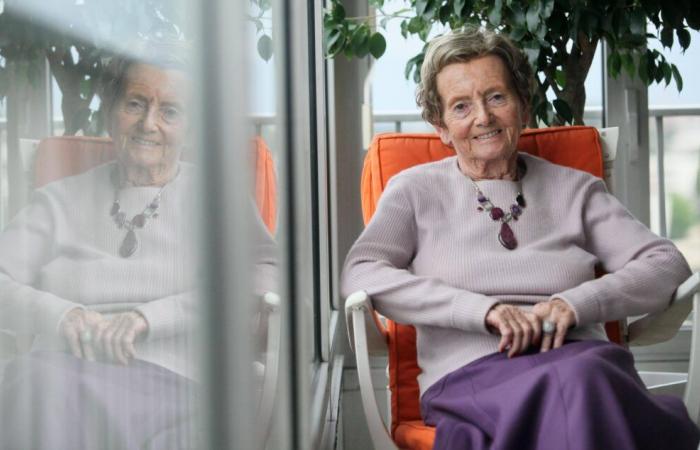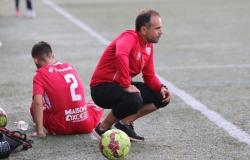What struck you first was his look. Lively. Piercing. Sparkling with intelligence. Then his voice – willful and passionate. A voice that seemed cramped in this tiny body, but which still vibrated with fierce determination. Unshakeable.
Denise Holstein knew Drancy. She survived Auschwitz. She almost died in Bergen-Belsen. But it was ultimately in Antibes that she died this Saturday, at the age of 97, surrounded by her family.
In October 2015, she welcomed us to her home to resuscitate her dark years. A story repeated a thousand times, in front of tens of thousands of college students. That of a slow descent into the antechamber of hell.
“No more tennis? I didn’t see what could be worse…”
“I was Jewish but for me it didn't matter. she began. My parents were not religious. Besides, when I was little, I wanted to go to catechism like my friends! My mother explained to me, laughing, that it wasn’t going to be possible…”
For the young Rouennaise, the word “Jew” took on meaning in December 1940, when she discovered signs hanging on certain shops: “Jewish Business” (“Jewish house”). Then in June 1942, when a German order required Israelites to wear the yellow star.
“It wasn't just a piece of fabric, insisted Denise. It meant we were different. In high school, we had to sit at the back of the class. We were forbidden to go on the platform. We were no longer allowed to go to the cinema, to the swimming pool or to a stadium. For me who loved playing tennis, it was abominable! I didn't see what could be worse…”
The “pire”alas, remains to come.
On January 15, 1943, the Holstein family was arrested at their home and interned in the Drancy camp.
“The beginnings were very hard, remembered the nonagenarian. We were kept in large rooms transformed into dormitories, with large bunk beds covered with a simple pallet. The food was disgusting, the chores exhausting. To wash, you had to undress in front of everyone. Some women preferred to forego washing themselves.”
Every week, three thousand people leave the camp for an unknown destination. “To work”suppose the inmates who name this mysterious place “Pitchipoï”.
On February 6, Denise celebrates her sixteenth birthday. But his health is deteriorating. She gets sick.
“The camp doctor diagnosed diphtheria. However, the Germans feared contagious diseases. I was evacuated to the hospital without allowing me to kiss my parents. I saw them, in tears, through the window of the 'ambulance. I was never to see them again.'
After several weeks of care, thanks to the desperate efforts of her grandmother, Denise was not sent back to Drancy. “I found myself in the Paris suburbs, in Louveciennes, in one of the centers for Jewish children managed by Ugif (1). As I was the oldest, I became an instructor. In charge of nine toddlers who were probably already orphans, but didn't know it.”
It was there that she learned, at the end of November 1943, that her parents had left for “Pitchipoï”.
At dawn on July 22, 1944, a German officer and men in civilian clothes ordered the center closed. Its forty-one residents were transferred to Drancy. They don't stay there long. On July 31, when the war already seemed lost for the Nazis, 1,300 prisoners were crammed into cattle cars. This is the last journey to “Pitchipoï”. The final convoy to… Auschwitz-Birkenau.
“I saw women raped and torn to pieces by dogs”
“What I saw there is indescribable, whispered Denise Holstein. CWhat we have said about the violence of the kapos, the hunger, the diseases, it is nothing if we do not understand that we live, day and night, in permanent terror! I have seen women raped and torn to pieces by trained dogs! I saw guards having fun riding their bikes over unfortunate people until they died! I saw Mengele (2) as I see you, in the infirmary, choosing the victims of his monstrous experiments.”
On December 30, as the Russian army approached, the teenager was again pushed onto a train. Direction Bergen-Belsen. “There, it was getting worse and worse. Lately, there was nothing to drink. So I swallowed water from a swimming pool in which corpses were floating. Which made me holds up? A phrase that I repeated to myself every morning: ''They won't get me''.”
Finally, on April 15, the British army liberated the camp. Denise returns to Paris. Find his grandmother. And strives, no matter what, to relearn how to live.
“Very quickly, I decided not to say anything, she confides. I felt that others didn't want to hear about it. They had been deprived of chocolate and they spoke of it as a terrible thing. Jews deported? It really wasn't their concern…”
And Denise Holstein is silent.
For 45 years.
Until Serge Klarsfeld, in 1990, asked him to provide his testimony on the Louveciennes tragedy. And that a teacher from the Antibes college of La Rostagne, Annie Bruzzi, encouraged him to speak in front of his students.
“For nearly thirty years, I told my story to young people who were the same age as me in 1942, she summed up. Even in the so-called difficult classes, I never had the slightest problem!”
She sighed. “Now, I no longer have the strength. However, when I see that the ideas of hatred resurface, I would like to speak, again and again. I am convinced that this is why I survived: to bear witness…”
In the twilight of her life, Denise Holstein confessed only one true regret: “That of not being able to accompany my two great-granddaughters to Auschwitz myself. To show them how lucky they are to live and grow up in a time like ours.”
In a world without yellow star, without kapo. And without a dog growling in the night.
1. General Union of the Israelites of France.
2. Josef Mengele carried out various medical experiments on victims of the Shoah.






